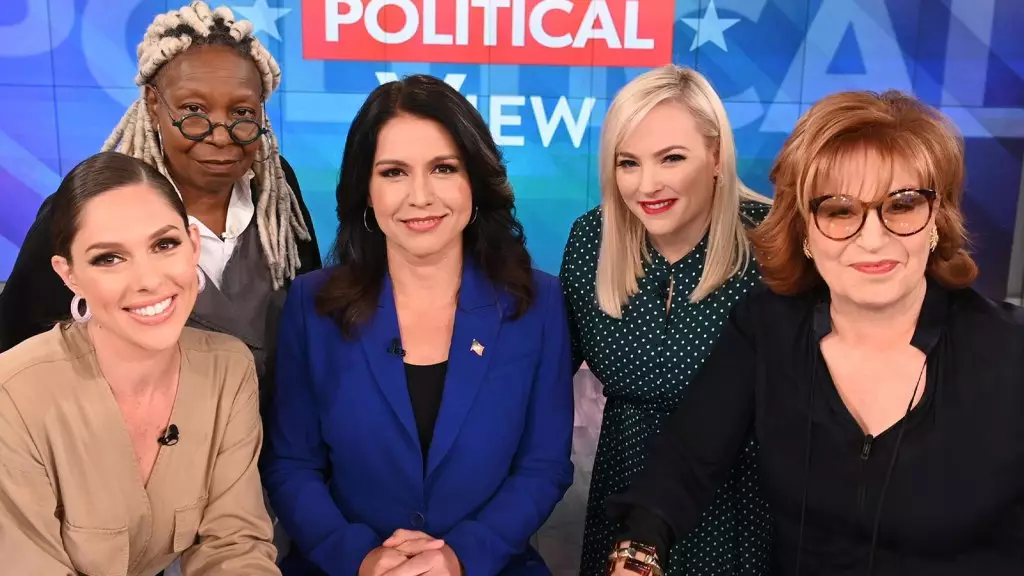Meghan McCain, the outspoken political commentator and daughter of the late Senator John McCain, has recently reignited discussions about her past experiences on the ABC talk show The View. Her remarks, made during an event with fellow former Presidential candidate Tulsi Gabbard, reflect a complex interplay of friendships formed and battles fought in the high-stakes environment of daytime television. Notably, McCain’s sentiments reveal deep-seated frustrations about her time on The View, hinting at ongoing tensions with former co-hosts.
The event in Philadelphia, titled Stand with Women, served as a platform for McCain to reconnect with Gabbard and reflect on their first meeting on The View in 2019. During this recollection, McCain illustrated the protective instinct she developed for Gabbard amid what she perceived as a hostile atmosphere. “Can I just say the last time we were on a stage together was when you were on The View?” Gabbard recalled, prompting McCain to recount her defense of Gabbard from the critical comments of their co-hosts. Highlighting her solidarity with Gabbard, McCain’s comments underscored the pressures that guests experience when dealing with a panel that can be unforgiving, especially given the show’s penchant for heated debates.
McCain conveyed vivid images from their time on the show, describing her experience as feeling like they were “vultures” circling Gabbard, who was in the crosshairs due to her unorthodox political positions. This moment of camaraderie was painted brightly against a backdrop of animosity, showcasing the vulnerability of public figures under the scrutiny of their peers. The exchange serves as a reminder of the often unseen emotional toll that public life can take on individuals, particularly women in politics.
Since departing from The View in 2021, McCain has not held back in voicing her grievances about the show and its remaining co-hosts. Her comments about her former colleagues have ranged from describing their dynamics as “rigged” to notably referring to them as “crazy old people.” Such remarks illuminate the persistent discord she feels post-exit, a sentiment likely intensified by the spotlight that the show casts on its participants.
McCain’s criticisms have also turned introspective, revealing the complex relationships that linger even after her departure. While she claims not to have maintained friendships with her former co-hosts, she acknowledges the presence of professional relationships forged with some staff members. “I don’t talk to any of the main co-hosts that I was with,” she stated in an interview, expressing her desire to protect the identities of those who remain in her circle for fear of backlash. This concern underscores an unsettling reality — the lengths to which individuals must go to preserve their dignity in a domain that thrives on drama and opinion.
The enduring legacy of McCain’s time on The View is punctuated by her promise to avoid returning to the show, having declared there was “not a chance in hell” she would ever reprise her role, even as a guest. This resolute stance signifies her complete severance from a chapter that once shaped her career and public persona. Such finality indicates a broader commentary on the nature of television discourse, especially when the environment is fueled by constant critique and public opinion.
As McCain continues her journey beyond the confines of The View, the implications of her remarks resonate deeply within the larger narrative of female political representation and the expectations placed upon them. The juxtaposition of friendships formed in adversarial spaces, coupled with the fragmentation of key relationships following her departure, paints a vividly complex picture of a woman navigating the volatile landscape of media and politics.
Meghan McCain’s reflections not only highlight her personal experiences but also serve as a broader commentary on the dynamics of public life, underscoring the importance of solidarity among women facing collective challenges. As she forges new paths and nurtures friendships, McCain remains a notable figure whose opinions and experiences continue to shape discussions on media representation and the essence of friendship amid adversity.
